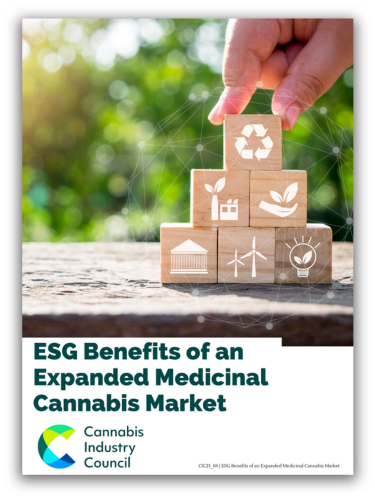Trusted guidance and resources
Trusted guidance and resources
ESG Benefits of an Expanded Medicinal Cannabis Market
Environmental, Social, Governance (ESG) is about creating a set of standards that measure a business’ impact on society, the environment, and how transparent and accountable it is.
When comparing the newly legalised and regulated medicinal cannabis market with the unregulated illicit cannabis market, it is clear there are significant ESG benefits of wider prescribing in a regulated market.
We believe that there is strong evidence to suggest that a better regulated medicinal cannabis market will have positive impact on the environment, wider society and the economy and stakeholders of the industry.
Explore the details below, or download a fully referenced version of the information below. You can also find out more about the ESG Working Group here.
Environmental
The establishment of a medicinal cannabis market in the UK can have various environmental impacts across the entire supply chain, including cultivation, processing, transportation, and disposal. Adopting sustainable and eco-friendly cultivation practices can lead to reduced environmental impact.

Medicinal cannabis is most often grown indoors under artificial lights and in controlled environments for the majority of the global supply, using a lot of power.
The question is where does the power come from to power the facility. It is important that when there is either a dynamic shift in an industry, or a new industry is emerging, to take advantage of complimenting that industry with other emerging technology, such as renewable energy.
We believe that the majority of the unregulated UK cannabis supply chain uses power off the National Grid (which is still heavily reliant on fossil fuels), or in a worst case scenario not pay for the power at all. For larger, unregulated cannabis farms, less detectable power can be delivered by diesel generators to produce crops.
According to the Government, in 2021, 41% of UK electricity came from renewable sources. However, there are also challenges with the current regulated market. In the UK all legal medicinal cannabis supply is grown in controlled conditions and imported from other countries, some far across the globe. This increases the carbon footprint between producer and patient, generating higher carbon emissions than could be drastically reduced in a regulated, domestic licensed facility / supply chain, utilising well engineered sustainable methods. Furthermore, Good Agricultural Practices imposed in the legal setting prohibit the use of pesticides on crops that may infiltrate water courses and damage wildlife.
Waste is unregulated in the illicit market, and with the fear of detection, there is an increased tendency for illicit cultivators to dump it where they can. Waste disposal issues may range from horticultural waste water mixed with fertiliser disposed of down sinks and the clogging of drains, to the risk of fly-tipping and the dumping of waste material in public open spaces like woodlands, lakes or rivers.
In a sustainable regulated market, waste must be disposed of in the correct manor due to strict licensing conditions.
In the global cannabis market, be it medicinal or wider adult use, plastic dominates product packaging as the most cost-effective solution but not the best when storing plant material. This, in addition to the use of single use vape cartridges, will contribute to the global issue of plastic contamination and other environmental issues.
Licensed companies should be required to use more sustainable solutions that are available on the market, such as bio-plastics and returns policy of used cartridges.
Social
Due to drug prohibition laws, cannabis has been sold over the years in the illegal market, alongside other criminal activity. As with most organised crime, there is likely to be limited social consideration, with the most extreme negative impacts coming from gang culture, human trafficking, or the social impacts of an industry not considering its wider stakeholder base.
In the current system, minority groups are more likely to face police interventions, such as stop-and-search, and more likely to receive custodial sentences for drug law infringements. According to Release UK “black people were stopped and searched for drugs at 6.3 times the rate of white people, while Asian people were stopped and searched for drugs at 2.5 times the rate, and those identifying as mixed race were stopped and searched for drugs at twice the rate of white people”.
Minors from ethnic backgrounds are also reportedly at significant risk. There is also the issue of individuals incarcerated for medicinal usage.
According to West Midlands Police, unregulated cannabis farms are very dangerous places and pose a serious risk of fire. Often the electricity meter has been bypassed and seriously overloaded electrical circuits run close to water-filled pipes. In 2012, it was reported that over £200m worth of electricity was stolen. Plants grown upstairs in a building can also cause floorboards to rot, presenting the danger of collapse.
It is also important to consider that sometimes the people working in these ‘farms’ are victims of human trafficking and working against their will. Amongst those, Thais, Vietnamese and Albanians are most vulnerable, with a large proportion of those individuals being minors.
Illegal activity at scale can result in social unrest, as is evidenced by the county-lines crisis as “criminals are using burgers and warm coats to recruit hungry, cold children into county lines gangs in towns and cities across the UK, experts are warning”.
In an unregulated market, the end user does not have an MHRA approved product complying with the high standards imposed on all UK medicines. Quality controls are the backbone of the pharmaceutical industry and are designed to protect society. Furthermore, there is limited structured patient care or safeguarding, in an illegal setting. This can leave vulnerable people open to potential deviation from a suitable medicine, and appropriate dosages, to treat a chronic condition.
The regulated ‘specials’ medicinal market has tested and certified products that are:
- Free from micro-toxins (tested to the British Pharmacopeia).
- Free from heavy metals and pesticides
- Accurate labels showing the percentage of THC and CBD, as well as other cannabinoids.
- Warning labels about the dangers of the product (such as drowsiness).
- Providence labels showing where product has been manufactured.
- Advice from health care professionals on appropriate dosages and titration.
On a positive note, North America has seen a notable increase in medicinal cannabis use amongst females and “cannamoms” for common health issues such as PMS, menopause, and endometriosis. However, there is still a lack of research around cannabis use throughout pregnancy and breastfeeding.
This brings us onto the issue of child safety, as reported in North America around consumption of edibles amongst minors and the need for child-safety packaging. The cannabis industry and consumers have a responsibility to ensure that minors are protected from accidental consumption, and products are not marketed in a way that make them attractive to children.
Finally, a wider adoption of medicinal cannabis could help the NHS mitigate the side effects of other prescription drugs, reduce the strain on the ambulance service and hospital beds, get people back into employment, and produce fairer societal outcomes to help rectify those that have been affected by prohibition.
The growth of a medicinal cannabis industry can bring numerous economic benefits to the UK, such as the creation of jobs in local communities, and capital investment. This is especially important in more rural settings where agriculture is suffering from factors such as global warming and reduced agricultural subsidies.
However, there are various socio-economic inequalities in the industry that need to be reviewed such as the diversity landscape, ensuring that there are fair and ethical opportunities for recruitment, employee progression and entrepreneurship.
Minority groups, specifically females, BAME and LGBTQIA+ community and individuals with a disability, are most likely to be vulnerable to systematic identity based racism or discrimination issues and have an unfair disadvantage.
Notably, these groups are also often underrepresented in clinical research and mainstream media. Recently, a UK study at Kings College London titled “Cannabis & Me” has struggled to attract black and Asian UK users, due to the study being met with suspicion on how data will be used and distrust of the establishment.

Governance

Governance is limited or non-existent in an unregulated setting. Examples range from a breach of UK laws that govern civil society; to failure to pay taxes, whether through business taxation, VAT, or PAYE contributions. For instance, unregulated grows are not subject to UK HSE and equalities legislation, and may have little or no standard operating procedures which are required within a registered company or licensed production facility.
All registered companies have statutory requirements to adhere to, ensuring a safe place to work, as well as providing data protection and diversity targets.
Good governance ensures equitable treatment of all stakeholders in an organisation.
Conclusion: Better stakeholder outcomes
The vast majority of cannabis consumers, including those who do so for medicinal reasons, source products from the unregulated market.
Increased UK Government support to help health care professionals (HCPs), such as GPs, understand the emerging legal market, will further empower our medical industry to provide medicinal cannabis as an option for treatment.
This can lead to better health outcomes, without the severe side effects caused by some other more invasive or addictive licensed medicines that can put a strain on the NHS and society.
Medicinal cannabis may not work for all patients. However, the education of all HCPs to understand the therapeutic benefits and drug interactions of medicinal cannabis will in turn support the migration of unregulated cannabis users to a regulated industry with strong ESG credentials:
- carbon negative,
- socially supportive,
- environmentally sustainable,
- and with good governance.
It is clear there is a strong ESG, in particular social, case for supporting the expansion of the medicinal cannabis market. Most importantly, getting this right will help patients with particular chronic conditions.
The Cannabis Industry Council’s ongoing ‘Protect our Patients’ campaign aims to deliver these much-needed improved patient outcomes.
Authors
- Hamish Clegg, Co-chair, ESG Working Group & Hilltop Leaf
- Sam Cannon, Co-chair, ESG Working Group & Be:yond Green
- Shazia Elahi, The Sanskara Platform
- Tom Meller, Vice chair, ESG Working Group & TMG Technologies
- Cannabis Industry Council ESG Working Group


